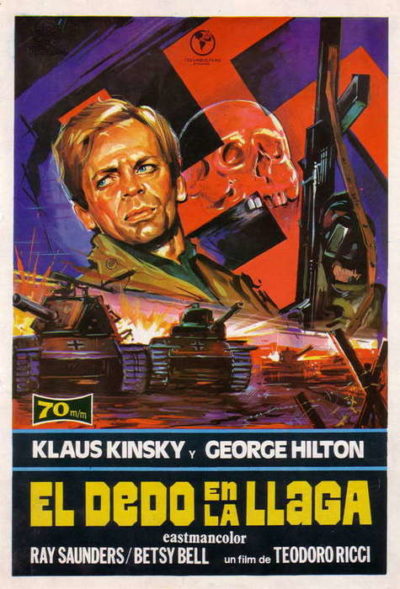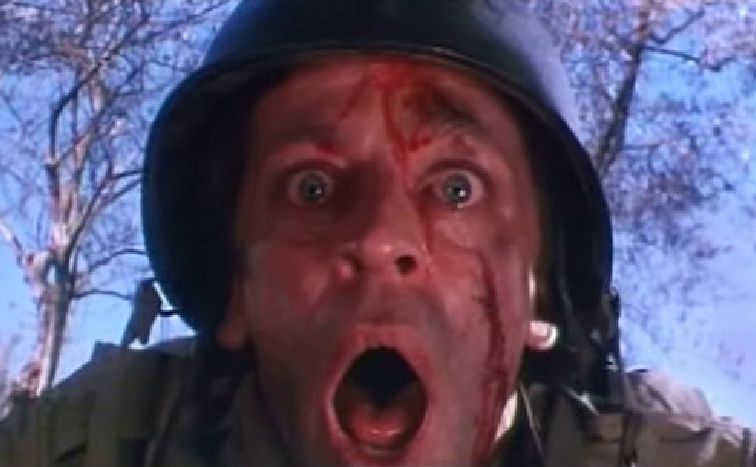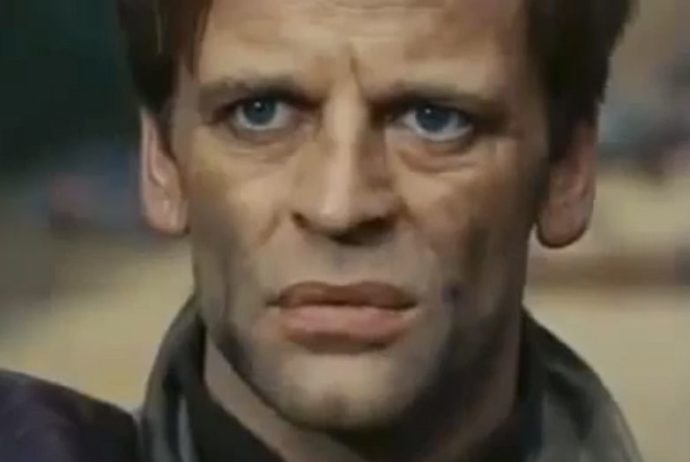Dir: Tonino Ricci
Star: George Hilton, Klaus Kinski, Ray Saunders, Betsy Bell
a.k.a. Salt in the Wound
It’s a bit odd how the Italian film industry in the early seventies were quite the war machine, churning out film after film about WW2. After all, it was less than 30 years since they had, let’s not forget, been on the losing side, thanks to Mussolini’s alliance with Hitler. I guess enough time had passed for a movie-going generation to arise, who hadn’t been through the war, and so weren’t averse to reliving it. A bit like the sudden burst of Hollywood films in the eighties about Vietnam – a conflict that didn’t exactly end well for the US of A, Rambo notwithstanding. Though here, there’s a little historical revisionism at work: even though it firmly takes place in Italy, it’s very much America vs. Germany, with the locals simply the residents of occupied territory, who welcome the Yanks as liberators. Not sure how entirely true that was; I’ll defer to historical experts.
The other aspect that’s particularly unusual here is Kinski’s role. While neither his first nor his last war movie, it’s the only one to this point I’ve seen where he plays an American, rather than a Naxi as you’d expect. Admittedly, he’s not exactly a heroic GI. Indeed, the opening scene sees Corporal Norman Carr (Kinski) engaging in a spot of murder and looting, not exactly authorized by the articles of war. He’s captured by Allied military police, and hauled up before a military tribunal along with another soldier, Private Calvin Mallory (Saunders). Both are found guilty and sentenced to face a firing squad the next morning. In charge of the squad who’ll be executing the execution, as it were, is Lieutenant Michael Sheppard (Hilton), fresh out of West Point, and who rigorous approach to doing things by the book, is the subject of some bleak amusement for his superiors, who have first-hand experience of the gulf between that and the realities of war.
 Carr and Mallory are literally up against the wall, when fate intervenes, in the shape of an ambush by German troops. The prisoners seize the chance to escape, and Sheppard, the only survivor of his squad goes with them. He’s quite open about the fact that he’s going to bring them back and make them face justice, and I have to say, Carr is remarkably chill about the prospect. [Mallory, meanwhile, is remarkably chill about virtually everything. He spent the night before his scheduled execution singing hymns, right up until his cellmate had had enough] After successfully ambushing a group of Nazi soldiers, they acquire a jeep, with the aim, expressed by Carr, of keeping as far away from actual fighting as possible. This takes them to the town of San Michele, which initially appears deserted. Except, the inhabitants have actually been in hiding. They suddenly pour out to greet what they believe to be the forces of liberation, rather than two war criminals and an officer with a stick up his ass.
Carr and Mallory are literally up against the wall, when fate intervenes, in the shape of an ambush by German troops. The prisoners seize the chance to escape, and Sheppard, the only survivor of his squad goes with them. He’s quite open about the fact that he’s going to bring them back and make them face justice, and I have to say, Carr is remarkably chill about the prospect. [Mallory, meanwhile, is remarkably chill about virtually everything. He spent the night before his scheduled execution singing hymns, right up until his cellmate had had enough] After successfully ambushing a group of Nazi soldiers, they acquire a jeep, with the aim, expressed by Carr, of keeping as far away from actual fighting as possible. This takes them to the town of San Michele, which initially appears deserted. Except, the inhabitants have actually been in hiding. They suddenly pour out to greet what they believe to be the forces of liberation, rather than two war criminals and an officer with a stick up his ass.
Naturally, our trio aren’t averse to being treated like heroes. Carr hits it off with local beauty Daniela (Bell), and Mallory befriends a local kid: fatal mistakes, as we’ll see. However, Carr hasn’t entirely reformed, and when Sheppard sees him attempting to make off with the church’s treasures, it takes a bit of two-fisted encouragement to dissuade the perp. Further discussion on the topic is rudely interrupted, with the appearance of a brigade of Germans, intent on re-capturing the town, and we’re deep into Saving Private Ryan territory the rest of the way. The first wave of Axis attacks is successfully repelled, not least because they weren’t expecting much resistance. However, this only provides a brief respite, and it’s not long before the Nazis return, in greater force and this time bringing tanks with them. Can our heroes hold out until help arrives?
“My mother was a whore.” So begins one of Kinski’s monologues, as he explains his cynicism to Daniela. It has to be said, he makes a compelling case, for example, pointing out the Germans have “God is with us” inscribed on their belt-buckles: everyone thinks that. I don’t want to spoil anything, but let’s just say the chances for either him or Mallory making it to the end, are severely hampered by the fact that their respective pals have all the survival skills of suicidal lemmings. Daniela, for example, rushes in to cling on to Carr’s arm, shrieking “I just want to be with you!” It doesn’t end well for her. It also leads to a point-of-view shot from inside one of the German tanks, where we get to see Klaus making the face shown at the end of the review. This must rank among the ten best Kinski faces of all time, and it probably the last thing I would want to see coming at me, even if safely embedded inside a tank.
The pacing is a bit off, in that the middle contains rather more sitting around an Italian village and chatting, than I would have said is strictly necessary. However, after a tendency for the early battles to be little more than schoolyard level spraying of automatic gunfire, the final confrontation is extremely well-staged and gives as good an insight into the terror of facing armored opposition as anything I’ve seen, the tanks being depicted basically as unstoppable. When that turret starts to swivel in your direction… you’d better get out of the way. Kinski’s character here is a fascinating one too. He’s clearly no saint, and has more baggage than an entire airport terminal, yet you sense he’s a product of circumstance rather than inherent malice. Carr has clearly thought about his situation, and decided it’s untenable, leading to him behaving on the purely selfish level. As such, it represents the other end from Ryan‘s heroic altruism, and is likely all the better for it. For my money, this is the best of the Kinski war films I have seen so far.

